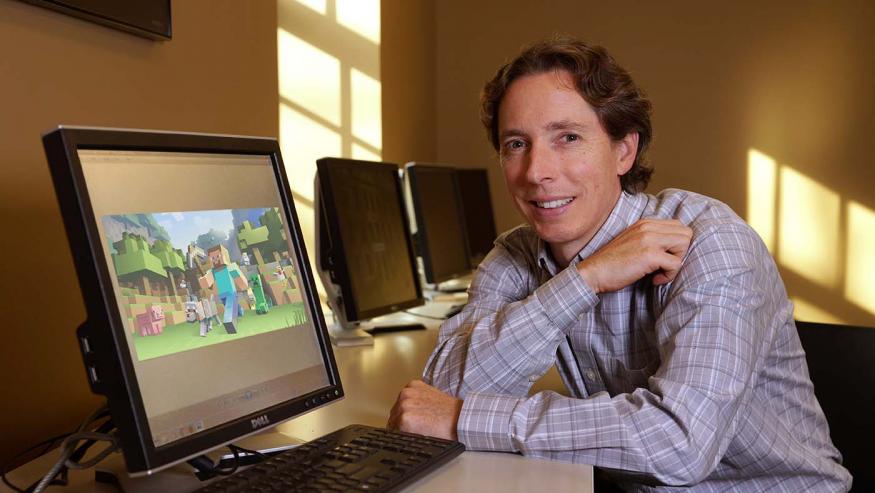
Communicating through soccer and Minecraft
For an educator, it's always a challenge to reach students who can't communicate as effectively in English. How does a teacher connect to students who speak another language at home? How can that connection be nurtured and inspired so the students will want to learn and be engaged at school?
Augustana's Dr. Michael Scarlett found a connection through Opportunity Kicks, a Quad-Cities non-profit serving immigrant and refugee students through competitive soccer.
An affiliated club has been active at Augustana College for four years, thanks to the efforts of Dr. Scarlett and a small but dedicated group of students. The club offers Thursday night tutoring, service project coordination such as coat and book collections, holiday celebrations and other ways to engage young people on campus.
Dr. Scarlett, also the faculty mentor for Augustana‘s men's soccer team, has combined his passion for soccer, education and research into a collaborative project based on the popular video game Minecraft.
The virtual classroom had to tackle an issue: Why do civilizations fail or succeed?
He was able to tap into his own children's love of the game for inspiration and problem-solving as he began to test an idea: By channeling this fascination with Minecraft, and its potential for "real educational value," he and three undergraduate students from his Elementary Social Studies Methods course came up with a plan to use the game during a weeklong Opportunity Kicks summer camp in 2016.
The Minecraft Summer Camp, funded in part by a research grant, allowed Dr. Scarlett and his directed study team to construct a real-time community in the game, giving 13 Opportunity Kicks learners the task to tackle global issues such as deforestation and global warming through a simulated reality. Dr. Scarlett set up a server on campus so all the students would be working in the same world. The virtual classroom had to tackle an issue: Why do civilizations fail or succeed?
So Dr. Scarlett used Minecraft EDU, modified a file he downloaded, and crafted a backstory: A small population was cryogenically frozen and reawakened 100 years later to find a collapsed civilization. Clues were left behind, and it was the task of the students to find those virtual clues and develop their theories.
For the research aspect, he wanted to know the potential of the game as a learning tool; its success would mean potential for future development for educators. His observation of the enthusiasm of the first participants showed a winning formula for engaging kids in learning.
"As far as conclusions go, I would say that game-based learning has value because it connects to children's natural motivation to play, which is very powerful for students who may struggle in school due to language barriers," he said. "The data we collected confirmed that students are highly motivated to learn using Minecraft, and that collaboration and creative problem-solving were two reasons they enjoyed using the game."
The intersection of emerging components of education in the 21st century — technology, virtual spaces and online learning — has Dr. Scarlett determined to carry on with his ideas to create innovative, project-based learning communities in virtual classrooms.
